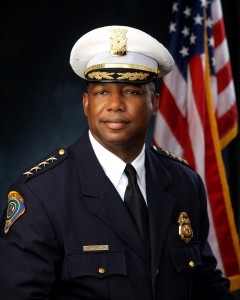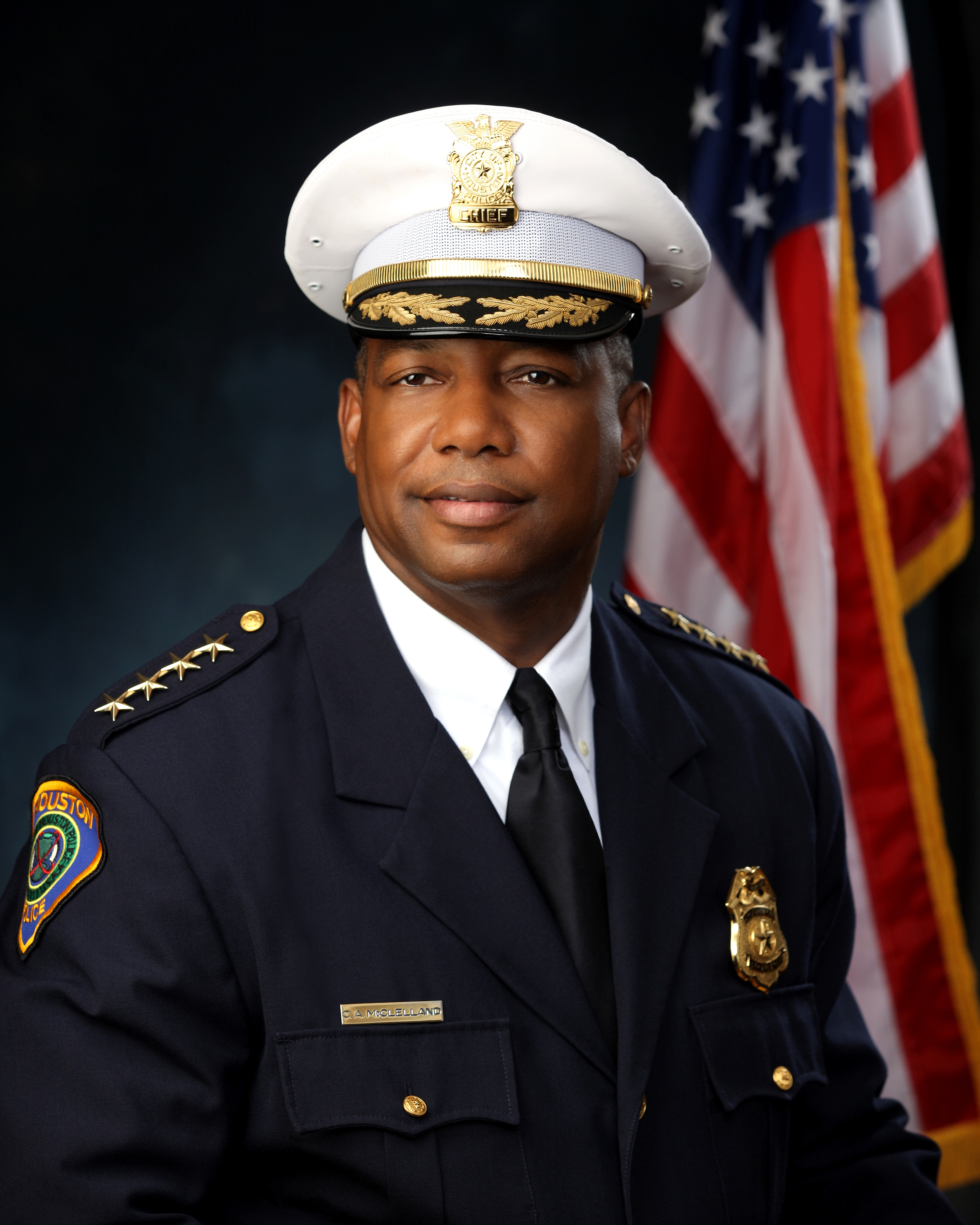Chief of Police discusses HPD’s role in working with media, community
Houston Police Department Chief of Police Charles A. McClelland Jr. spoke to journalists and the general public about the importance of the relationship between HPD and the media, as well as the community, at a media event hosted by the Society of Professional Journalists (SPJ) Feb. 18.
The Houston Chapter of SPJ organized the discussion, which was held at The Printing Museum, in order to better understand these relationships in light of recent events occurring around the country.
“Relationships matter, whether that’s police and media or whether that’s police and the community,” McClelland said. “They do.”
McClelland presented law enforcement’s perspective on cooperation with the media, inaccurate reporting, officer accountability, and how the media affects police portrayal.

The police chief emphasized the importance of cooperation between HPD, the media and the community.
“This is very important, especially in light of what’s going on around the country and some of the cities around the United States,” McClelland said. “It’s a very important role, and certainly one that is grounded in our Constitution, the First Amendment. All of us in law enforcement certainly understand that role of educating and informing the public.”
McClelland joined the HPD in 1977. He explained that since then, media has changed.
“The media, how we consume information, how information is dispensed, has certainly changed,” McClelland admitted. “Now a great emphasis is certainly put on time… I understand that.”
McClelland believes that the majority of the public wants to and is willing to trust what they read in the media or see on television. Because of this, he emphasized that there is great responsibility in ensuring that the information provided to the public is accurate.
“Certainly, you [the media] have a role and responsibility to educate the public, and we [HPD] have a role to be as open and transparent that we can be…” McClelland explained.
As an example of inaccurate reporting, McClelland discussed the shooting of Ron Sneed in Freeport, Texas. He explained that the media’s rush to go to press caused failure to initially publish accurate information and could have resulted in civil disobedience or riots.
“In the haste of getting something out first, the information was inaccurate,” McClelland said. “No fact checking. I mean, that’s irresponsible and it was to me, in my opinion, hastily done.”
Although McClelland understands the need to inform the public as soon as possible, he also realizes that publishing misinformation can result in more problems.
In an effort to keep the media and community up-to-date, McClelland confirmed that he holds a monthly news conference during which he cooperates fully.
“I don’t duck any hard questions; you’ve never heard me say ‘no comment,’ and I’ve always said as much as I could without violating the law or influencing a case that’s under investigation,” McClelland emphasized. “We must have open dialogue, we must be able to say things sometimes that we don’t want to hear, but we always must speak the truth.”
Following the discussion, HPD Public Information Officer Jodi Silva further discussed the relationship between the department and the media, describing it as symbiotic.
“We [HPD] provide information to them [the media] regarding active scenes or stories for their newscasts,” Silva said. “In turn, we also solicit positive media coverage from them or ask for their assistance in distributing surveillance video, mug shots or composite sketches of wanted suspects in order to help solve crimes.”
Silva believes that the media does play a part in the public’s perception of HPD.
“Media does make up a portion of how a person forms an opinion about the police department – whether good or bad,” Silva said. “People take the information they receive from the media, combine it with their own perceptions of the world and form their own opinion.”
One such example is the shooting of Michael Brown in Ferguson, Mo. This incident sparked ongoing speculation that officers are not held accountable for their actions. McClelland expects his officers to adhere to all policies and procedure, and if at any point they fail to, there will be repercussions.
McClelland strongly believes that HPD’s conduct and behavior should be beyond reproach. Perfect? No. But he certainly expects their ethics, morals and commitment to the rule of law never to be questioned.
“I mean, we [HPD] have awesome responsibility when it comes to taking someone’s freedom away, liberty away, and also in extreme, extreme exigent circumstances, taking someone’s life,” McClelland said. “That’s a tremendous responsibility.”
McClelland also believes in Robert Peel’s seventh principle, which states that the police are the public, and the public are the police.
“We don’t have any special place to go get police officers. They come from our community. They come from our neighborhoods,” McClelland said. “There’s no perfect people, there’s no perfect police officers. But with that authority and trust comes awesome responsibility on us.”
In closing, McClelland clarified that no matter how careful HPD is, there will always be an officer or two who simply will not obey the policies and procedures put in place. He insisted that behavior of such will not be tolerated.
“You’re always going to have individual officers that won’t do the right thing,” McClelland admitted. “I have some officers that aren’t going to follow the policy, not going to follow their training, and in some cases may not follow the law. Those are the officers that, when identified, and I have evidence, they’re going to be kicked out of my organization, and if they violate the law, I’m going to do everything in my power to make sure that they go to jail.”


Good job Sammi!
Communication is key. I went to a media and law seminar once for Dr. Packard class, and the main issue was lack of communication efforts between media, law enforcement and administration.
In some instances like school shootings, the first communication is often distributed from students in the building who are using social media outlets to get the news out–before both media and police.